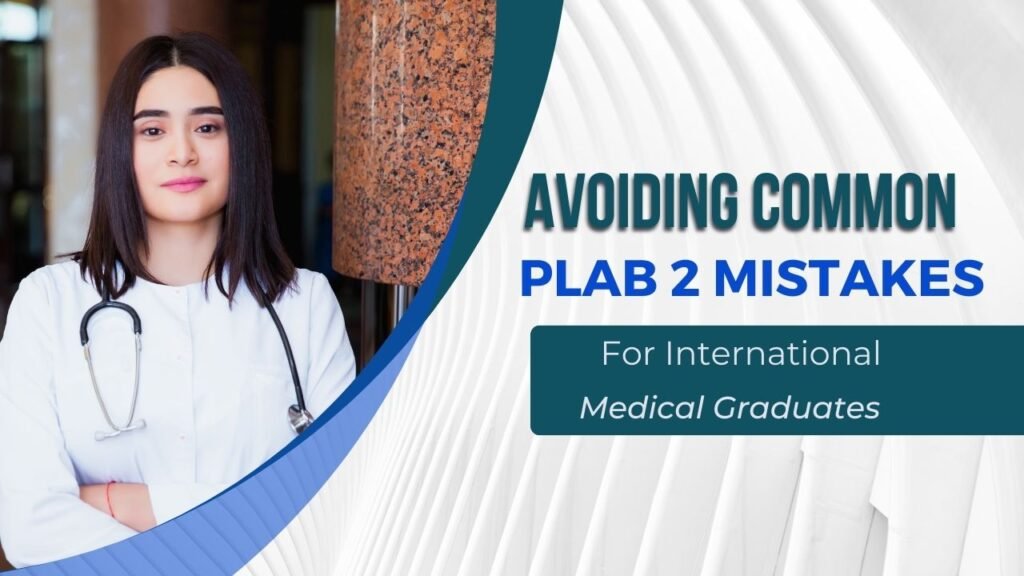Being an international medical graduate (IMG), one will find themselves facing different issues in their thriving to build a career in the UK medicine sector. The PLAB 2 is like stepping into the lion’s den. As a trained leopard, the subtle but ever-present intimidation cannot be ignored; however, I am confident that I will walk through the fire unscathed. It is a detailed rating scale which determines the candidates’ skill competencies in clinical setting, communication and basic knowledge of medicine. Yet, the PLAB 2 test, no doubt, is something of a challenge and it takes many poor candidates by surprise, with their failure resulting from errors that are, in fact, easily avoidable. In this blog post, we shall examine the fundamental mistakes and offer some actionable tips which will help you clear your PLAB 2 application.
The PLAB 2 covers everything a UK-trained doctor might encounter on their first day of Foundation Year Two (F2). It assesses your ability to apply knowledge to patient care, emphasizing practical skills over rote memorization. All questions align with current best practices and evidence-based guidelines.
Common Mistakes
Lack of Proper Preparation
The key point here being proper preparations which is something that builds up the success in the PLAB 2 exam. On the other hand, so many IMGs overestimate the quantity of time and strain that is required to meet the standards of this hectic exam and begin to lose confidence.This often leads to:
- Not dedicating sufficient time to study: It may be possible IMGs do not recognize how much information to be covered for the exam, affecting on the adequacy of study they do.
- Neglecting essential topics in preparation: Failing to give enough attention to the not-so-favorite or the not-so-wanted subjects and devoting all the focus to the ones that are comfortable and interesting may cost a student his/her success.
- Using ineffective study resources: Resorting to obsolete or inadequate materials for studying can obviously disappoint you and dog postponing of understanding and the retention of the core ideas.
To ensure not to commit the mistake, imagers must have a learning strategy well-organized, which above all covers all relevant material parts and allows enough time for review and practice. Learners will be able to set themselves up for success by using high quality PLAB 2 course packages, which consist of textbooks, online course modules and mock tests.
Test-Taking Anxiety
It is not unusual for IMGs to experience dreadful test anxiety on their way to getting PLAB 2 exam cleared, not only because it is the ‘last step’ before the big leap to their dream but also because of the anxiety of meeting the minimum performance standard. This anxiety can manifest in various ways during the exam, including:This anxiety can manifest in various ways during the exam, including:
- Feeling overwhelmed by exam pressure: Fear of failure or eagerness to conquer success, may bring stress to the work, which hinders attention and performance.
- Poor time management during the test: The processing of information and timely decision-making are complex because miscalculating the pace, causing time to be wasted unnecessarily, or making rash choices leads to an incomplete response or hasty decisions.
- Making rushed decisions or unnecessary answer changes: Testing nervousness may make IMGs doubt themselves and hasten answer-changing drastically, while the chances of being successful are low.
To cope with test anxiety, imagery group members could use relaxation strategies including deep breathing exercises, visualizing their success or mindfulness meditation. Moreover, implementing appropriate time management tactics could assist to lessen anxiety levels seen during exams normally; this could be achieved by setting durations for every station and establishing priority tasks.
Communication Issues
The ability to communicate effectively is a key area which is included in the assessment of PBLA 2 exam pro because it is a reflection of the capability to interact with patients, colleagues and other healthcare professionals without any difficulty. However, IMGs may encounter challenges in this area, including:However, IMGs may encounter challenges in this area, including:
- Struggling with British medical terminology: Moreover, terms common within the language of one culture may be rare or non-existent in the culture of the other, and minor language peculiarities can also evoke difficulties in accurately understanding and transmitting the information.
- Unclear communication during OSCE stations: Incompleteness or unclear communication when working at Objective Structured Clinical Examination (OSCE) stations may end up preventing quality patient interaction as well as proper assessment.
To tackle language problems, IMGs staff have to become accustomed with commonly used medical abbreviations and terminology within the UK healthcare system. Furthermore, the opportunity to feedback improvement areas on communication skills by practicing clear and concise communication skills during mock OSCE scenarios will certainly add to the confidence and proficiency of the health professionals in this field.
Technical Skills
The ability to carry out different organizations is a primary need for anyone to succeed in the PLAB 2 test since the candidates are tested to see if they have expertly performed the various clinical tasks in an efficient and accurate way. However, IMGs may struggle with technical skills due to:
- Lack of proficiency in performing clinical skills: If there is insufficient training or less actual practice in some procedures, such students may have a tough time responding to the station requirements.
- Hesitation or inefficiency during OSCE stations: The tension or the lack of courage may cause the practitioner to demonstrate reticence when doing clinical activities which might, in turn, influence his overall performance negatively.
For technical skill development, IMGs should take emphasis on hands-on practice and should try to find ways to work under supervision and improve on their clinical abilities through simulated patient encounters. In addition to this, a feedback loop from mentors and peers may unlock secrets on how to improve your skill sets.
Tips to Avoid Mistakes
Develop a comprehensive study plan
Try to plan your study schedule and make sure that you have enough time to go through all the relevant subjects and have enough time to go over your study material. Identify individual learning segments and determine study period length. Implement this to monitor your development.
Utilize high-quality PLAB 2 preparation materials
Besides, due to the fact that you can barely go to class freely because of the short deadlines, make sure that you purchase academic materials like books, online learning platforms, and mock-exams to help you prepare well. Use materials like guides and workbooks that are up-to-date, comprehensive and which are in alignment with the exam format and content.
Practice active learning techniques
Employ an active learning approach, for example spaced repetition, flashcards, and practice questions, which will work to strengthen your understanding of the main concepts and make them have more durability. The best way to approach the course is by actively participating in study groups or discussion forums with your peers to share your views and thoughts.
Manage test anxiety through relaxation techniques and time management strategies
Utilize breathing techniques, meditation, or physical exercise which relieve tensions to decrease anxiety and foster a relaxed environment for you. Be proficient in scheduling skills that entail sorting out the jobs, setting the targets within the timelines and defining the specific, practical time periods for each reading session.
Familiarize yourself with common medical abbreviations used in the UK
Take so much time to study and memorize medically frequently used abbreviations and acronyms within the UK healthcare system. Use flashcards and mnemonic devices to augment recall and restate new knowledge.
Practice clear and concise communication during mock OSCE scenarios
Implementing role playing exercises or standardized patient OSCE stations can help create a safe environment for practicing communication skills under clinical conditions. Give clear communication, understand the patient well, and react differently depending on the patient cue or concern.
Hone your clinical skills through regular practice and feedback
Take advantage of available facilities to hone your clinical skills by taking part in supervised work like clinical rotations, internships, or volunteer opportunities. Patient evaluations from mentors, preceptors, or consultation with standardized patients will allow us to identify areas for improvement in addition to tracking progress over time.
Conclusion
Success in the PLAB 2 exam requires diligent preparation, effective communication, and proficiency in clinical skills. By avoiding common mistakes and implementing the tips provided in this blog post, IMGs can enhance their readiness and approach the exam with confidence. Remember, preparation is key, and with dedication and perseverance, you can overcome any challenges that come your way.
Subscribe to our blog for more PLAB 2 preparation insights and updates.
Share your PLAB 2 exam experiences or questions in the comments below.
Download our free PLAB 2 preparation guide for additional support and resources.

